

Google & The Death Of Osama Bin Laden. I remember distinctly how Google reacted during the 9/11 attacks. Miserably, having to resort to using its ad space and special links on its home page to keep people informed, because its results were so out of date. How things have changed, in so many ways. HRM Asia - The Google Code. Not all internet startups failed in the early part of the new century. Some, including the garage creation of university friends Sergey Brin and Larry Page, have gone on to be among the hallmarks of the world wide web. Having begun as a search engine for Stanford University in California in 1996, Google has grown to be the favoured engine for the entire world. Its algorithms and codes now help users throughout the planet locate not just relevant websites, but also news, email, academic resources, and even geographic locations.
Such a rapid expansion of size, product range, and user base doesn’t happen without organisation. But while the numbers and office locations expanded, Google has held on to some of the original management philosophies its founders first inspired. Google Caffeine: 9/11 marked a turning point. Newshounds and marketers may still debate whether Google's Caffeine, which now delivers search results from updated sites within seconds, is fast enough. But it wasn't too long ago that it was acceptable for Google to update its index only once every 30 days. It turns out that the attacks of September 11, 2001, marked a turning point in Google's progression toward offering near-real-time web updates with Caffeine, its latest web indexing system, which was introduced on Tuesday.
The events spurred Google to focus more on immediacy. GOOGLE NEWS - Bits Blog. Friends Newsletter (July 2003) Q&A with Krishna Bharat of Google News Google News is one of the largest and most up-to-date news services online, gathering content from more than 4,500 online news sources around the world, then determining which stories are related and grouping them based on importance.
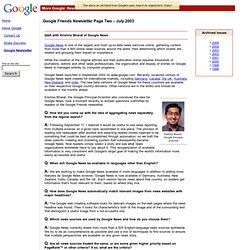
While the creation of the original articles and their publication online requires thousands of journalists, editors and other news professionals, the organization and display of stories on Google News is managed entirely by computer programs. L'actu media web - Le créateur de Google News donne sa vision du journalisme en 2015. The man who created Google news - AbhiSays.com. Today I will tell you about the creator of Google news. So the man who invented Google news is an Indian. His name is Krishna Bharat. Krishna is basically from Bangalore. He completed his schooling from St. Joseph’s Boys’ High School in Bangalore, and received an undergraduate degree in computer science from IIT Madras. For this innovation, he won the 2003 Webby Award in the news category.
Let’s see his interview where he talks about the growing web trends and search engine optimization, etc. Article: Google News Creator Watches Portal Quiet Critics With 'Best News' Webby. The beta tag still hangs on Google News, but in the year since it launched, the computer-generated news portal has achieved alpha status for millions of users looking for the latest news. The 2003 Webby Award winner for best news site wasn't dreamed up by marketers looking for a way to extend the ubiquitous Google brand. It started with one avid news consumer trying to manage the flood of information in the days after Sept. 11, 2001.
Krishna Bharat, Google's principal scientist, turned to Google's search engine to create a news portal organized like a newspaper but constantly updating as news sites posted stories. With his personal news tool, Bharat could read headlines from around the world at a glance, and with a click he could follow the links to the source. Warren Bennis: Google's Growth Engine - Past Opinions. Long before Google filed, in April, for its upcoming IPO, the Silicon Valley company had achieved something rare in business—it had become a verb.
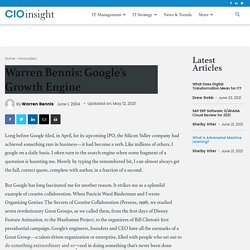
Like millions of others, I google on a daily basis. I often turn to the search engine when some fragment of a quotation is haunting me. Merely by typing the remembered bit, I can almost always get the full, correct quote, complete with author, in a fraction of a second. How Marissa Mayer Almost Killed AdSense (Kind Of), and More. How Marissa Mayer Almost Killed AdSense (Kind Of), and More Iionnovate put up an audio interview with Google’s Marissa Mayer.
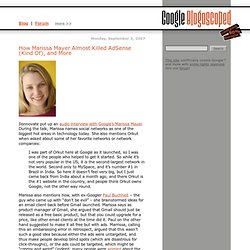
During the talk, Marissa names social networks as one of the biggest hot areas in technology today. Gmail Gets New Experimental “20% Time” Features Today. It is a well known fact that Google is a employer that allows their employees to spend 20% of their time doing personal projects.
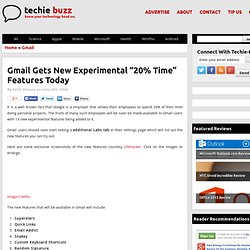
The fruits of many such employees will be soon be made available to Gmail users with 13 new experimental features being added to it. Gmail users should soon start seeing a additional Labs tab in their settings page which will list out the new features you can try out. Here are some exclusive screenshots of the new features courtesy Lifehacker. Click on the images to enlarge. Gmail Labs? Google pre-announced a mysterious new feature for Gmail.
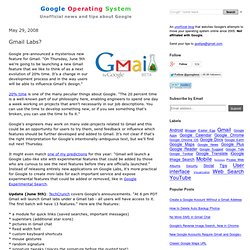
"On Thursday, June 5th we're going to be launching a new Gmail feature that we like to think of as a next evolution of 20% time. It's a change in our development process and in the way users will be able to influence Gmail's design. " Innovation, Imagination, Creativity — Google VP of Search Products Tells Story of Gmail. In this iinnovate podcast, Marissa Mayer — Google VP of Search Products and User Experience — talks about the innovation and methodology behind some of Google’s products.
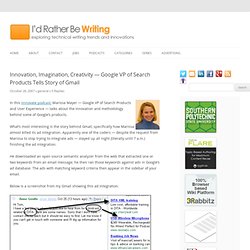
What’s most interesting is the story behind Gmail, specifically how Marissa almost killed its ad integration. Apparently one of the coders — despite the request from Marissa to stop trying to integrate ads — stayed up all night (literally until 7 a.m.) finishing the ad integration. He downloaded an open source semantic analyzer from the web that extracted one or two keywords from an email message; he then ran those keywords against ads in Google’s ad database. The ads with matching keyword criteria then appear in the sidebar of your email. Below is a screenshot from my Gmail showing this ad integration. History of Gmail. Gmail by Google logo.
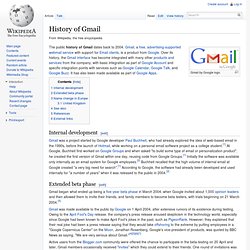
The public history of Gmail dates back to 2004. Gmail, a free, advertising-supported webmail service with support for Email clients, is a product from Google. Over its history, the Gmail interface has become integrated with many other products and services from the company, with basic integration as part of Google Account and specific integration points with services such as Google Calendar, Google Talk, and Google Buzz. It has also been made available as part of Google Apps. Internal development[edit] Extended beta phase[edit] Gmail. Gmail is a free (gratis), advertising-supported email service provided by Google.[5] Users may access Gmail as secure webmail,[6] as well as via POP3 or IMAP4 protocols.[7][8] Gmail initially started as an invitation-only beta release on April 1, 2004[9] and it became available to the general public on February 7, 2007, though still in beta status at that time.[10] The service was upgraded from beta status on July 7, 2009, along with the rest of the Google Apps suite.[11][12] Features[edit] Storage[edit] On April 1, 2005, the first anniversary of Gmail, Google announced an increase from 1 GB.
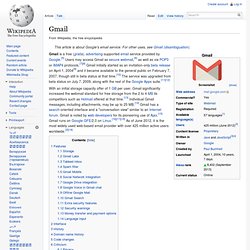
Georges Harik, the product management director for Gmail, stated that Google would "keep giving people more space forever. Sadagopan's weblog on Emerging Technologies,Thoughts, Ideas,Trends and The Flat World. The History of GMail: Who Invented It & Privacy Concerns of Spidering Email Content. Written by: John Hewitt•edited by: Linda Richter•updated: 10/15/2009 Google showed the world that web e-mail could be as robust and functional - if not more so - than a regular e-mail client when they released the beta version of Gmail in 2004 to the general public.
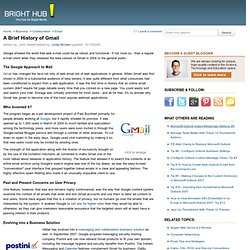
The Google Approach to MailGmail has changed the face not only of web email but of web applications in general. When Gmail was first shown in 2004 to a substantial audience of beta testers, it was quite different from what consumers had been conditioned to expect from a web application. It was the first time in history that an online email system didn't require full page reloads every time that you clicked on a new page. You could easily sort and search your mail. Marissa Mayer, VP of Search Products and User Experience at Google. Marissa Mayer is a key figure at Google and has much influence in the design, development, and usability of Google products we use every day, such as search and Gmail.
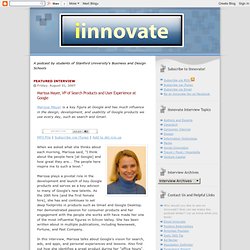
MP3 File | Subscribe via iTunes | Add to del.icio.us When we asked what she thinks about each morning, Marissa said, "I think about the people here [at Google] and how great they are... The people here inspire me to such a level. " Marissa plays a pivotal role in the development and launch of key Google products and serves as a key advisor to many of Google's new talents. As the 20th hire (and the first female hire), she has and continues to set deep footprints in products such as Gmail and Google Desktop. Developer Blog. The 15 Percent Solution. What if your boss said you could just daydream and play six hours each week, on the company's dime?
A startling idea for those with stodgy supervisors, this is precisely what 3M Corp. asks of its scientists. For decades, engineers at the St. Good Agile, Bad Agile. When I was growing up, cholesterol used to be bad for you. It was easy to remember. Fat, bad. Cholesterol bad. Salt, bad. Everything, bad. Up until maybe a year ago, I had a pretty one-dimensional view of so-called "Agile" programming, namely that it's an idiotic fad-diet of a marketing scam making the rounds as yet another technological virus implanting itself in naive programmers who've never read "No Silver Bullet", the kinds of programmers who buy extended warranties and self-help books and believe their bosses genuinely care about them as people, the kinds of programmers who attend conferences to make friends and who don't know how to avoid eye contact with leaflet-waving fanatics in airports and who believe writing shit on index cards will suddenly make software development easier.
You know. But I've had a lot of opportunity to observe various flavors of Agile-ism in action lately, and I now think I was only about 90% right. No, just kidding. The Bad Kind Yeah. Thoughts on Google’s 20% time. Sergey Brin and Larry Page on Google. Joe Beda's EightyPercent.net. Tony posts some comments about 20% time at Google and how it might not work at other companies like MS.